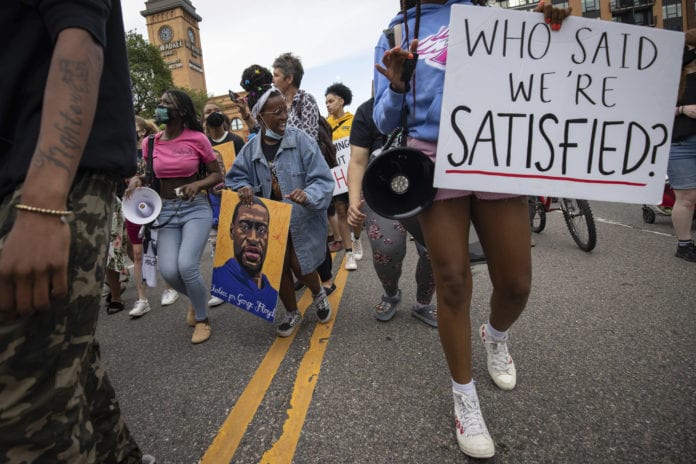McKinley said a second pilot program was held this spring in conjunction with Duke Divinity School and featured Black and Latino clergy focusing on immigration and policing issues and resulting trauma faced by communities of color. He hopes the program will next be a national one that supports teams of two senior leaders and two younger “next-generation” pastors or seminarians in cities where there have been high-profile incidents of police violence.
“Change is not going to come unless we work to bring about that change,” McKinley said.
Episcopal Bishop Bonnie Perry of Michigan hopes this moment can “create a movement in the Episcopal Church and beyond.”
Six Episcopal bishops, including Perry, Presiding Bishop Michael Curry, the Rev. Mariann Budde of Washington, D.C., and the Rev. Craig Loya of the Episcopal Church in Minnesota, will lead a “prayerful commemoration” of Floyd’s life on the first anniversary of his death.
The prerecorded service will stream at 8 p.m. Eastern on Tuesday (May 25) on the Facebook pages of the Episcopal Diocese of Indianapolis and other participating dioceses. The service will include a prayer of lament from George Floyd Square in Minneapolis; a candlelight “act of remembrance” from Ferguson, Missouri; and a video marking the 9 minutes and 29 seconds Chauvin knelt with his knee on Floyd’s neck.
“My hope for this service is that we might mark the anniversary of George Floyd’s murder nationally, and then be motivated to act locally, addressing issues of systemic racism in our own unique contexts,” said Perry in a written statement.
In Minneapolis, Holy Trinity Lutheran Church, which opened its doors to offer sanctuary and provide medical support to demonstrators in May 2020, will participate in several events to mark the anniversary, according to the Rev. Ingrid Arneson Rasmussen, including a remembrance event at George Floyd Square and leading an artistic space for “community laments.”
Faith in Public Life, a justice-focused coalition of faith leaders, released a short video of faith leaders remembering Floyd and calling for police accountability, along with a statement from CEO Jennifer Butler calling for “true justice” and advocating for the BREATHE Act, which would redirect tax money from policing to public resources. “People of faith have an important role to play in this moral movement, following the lead of prophetic organizers who have brought about this historic moment,” Butler said.
In the video, the Rev. Jacqui Lewis of Middle Collegiate Church in New York City said justice would be Floyd — and others killed by gun violence, especially by police — still alive. And Rabbi Danya Ruttenberg, scholar in residence at the National Council of Jewish Women, appealed to Scripture, saying, “The verses in Deuteronomy command us not just to issue a verdict when the bar for accountability is on the floor, is in the basement, is deep in the molten core of the earth, but to set up systems of justice, that are just for everybody, all of the time.”
Looking back, LA pastor Jn-Marie said it’s been difficult for many faith leaders to fully embrace Black Lives Matter. Some may not agree with the movement’s support for the LGBTQ community or have a hard time grappling with peaceful demonstrations that have resulted in confrontations with police, Jn-Marie said.
“I think a lot of pastors believe … that in order for them to support (the movement), Black Lives Matter has to behave a certain way,” said Jn-Marie, who has participated in marches that started peacefully but ended with numerous arrests and tense standoffs with police. “It has to adhere to a certain philosophy and they just can’t support Black Lives Matter because Black lives matter, but the movement has to fit within the parameters of ‘respectable Negroes’ or respectable politics and BLM pushes back against that.”
Since Floyd’s death, Southern California religious leaders alongside Black Lives Matter leaders have called on cities to spend less on police and incarceration and more on youth programs and housing. Jn-Marie with Black Lives Matter LA has advocated for the ousting of city leaders like LA County District Attorney Jackie Lacey, over what activists have seen as a mishandling of police brutality cases.
Since then, LA County voters in November approved a measure that will redirect more county funds toward social services and incarceration alternatives. Lacey, who had the backing of police and sheriffs unions, lost her fight for the city’s top prosecutor post to challenger George Gascón, who’s championed Black Lives Matter LA’s criminal justice activism.
Now, Black Lives Matter LA activists are aiming to topple the Los Angeles Police Protective League, the union that represents more than 9,000 police officers.
“We’ve got to stay in these streets,” Jn-Marie said.
This article originally appeared here.

